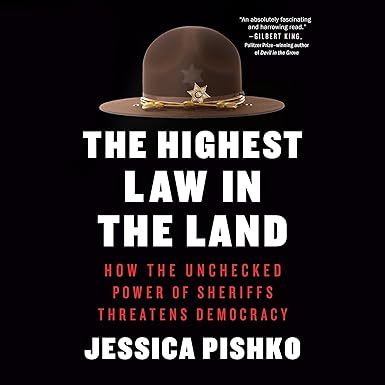
The Highest Law in the Land: How the Unchecked Power of Sheriffs Threatens Democracy
by Jessica Pishko
Published
Not found
Pages
Not found
Language
English
Publisher
Penguin Audio
Available Formats & Prices
View on AmazonKindle
$16.99
Hardcover
$28.80
Audiobook
$19.69
Audio CD
Not found
About This Book
Shortlisted for Columbia Journalism School’s J. Anthony Lukas Prize A Publishers Lunch NonFiction Buzz Book| Named Most Anticipated by Los Angeles Times A leading authority on sheriffs investigates the impunity with which they police their communities, alongside the troubling role they play in American life, law enforcement, and, increasingly, national politics. The figure of the American sheriff has loomed large in popular imagination, though given the outsize jurisdiction sheriffs have over people’s lives, the office of sheriffs remains a gravely under-examined institution.
Locally elected, largely unaccountable, and difficult to remove, the country’s over three thousand sheriffs, mostly white men, wield immense power—making arrests, running county jails, enforcing evictions and immigration laws—with a quarter of all U.S. law enforcement officers reporting to them. In recent years there’s been a revival of “constitutional sheriffs,” who assert that their authority supersedes that of legislatures, courts, and even the president.
They’ve protested federal mask and vaccine mandates and gun regulations, railed against police reforms, and, ultimately, declared themselves election police, with many endorsing the “Big Lie” of a stolen presidential election. They are embraced by far-right militia groups, white nationalists, the Claremont Institute, and former president Donald Trump, who sees them as allies in mass deportation and border policing. How did a group of law enforcement officers decide that they were “above the law?” What are the stakes for local and national politics, and for America as a multi-racial democracy?
Blending investigative reporting, historical research, and political analysis, author Jessica Pishko takes us to the roots of why sheriffs have become a flashpoint in the current politics of toxic masculinity, guns, white supremacy, and rural resentment, and uncovers how sheriffs have effectively evaded accountability since the nation’s founding. A must-hear for fans of Michelle Alexander, Gilbert King, Elizabeth Hinton, and Kathleen Belew.
Introduction
A deep dive into the often-overlooked corridors of power reveals a pressing concern for democratic governance. "The Highest Law in the Land: How the Unchecked Power of Sheriffs Threatens Democracy" sheds light on a formidable force operating with little oversight, raising essential questions about the foundations of law and order in America. As sheriffs wield more control over vast territories and marginalized communities, their unchecked authority puts the core democratic tenets in jeopardy.
This thought-provoking book delves into the evolution of this power, offering a thorough examination of its implications for the future of American democracy.
Key Takeaways
Sheriffs possess significant often unchecked power that can challenge democratic principles. Understanding sheriffs' influence is crucial for safeguarding community rights and democracy. The balance of power requires transparency and accountability within law enforcement.
Detailed Description
In a landscape where authority can operate without limits The Highest Law in the Land" unveils the hidden power of sheriffs in the United States. This book examines how these officials often operating without adequate checks hold significant influence over local jurisdictions and decision-making processes. Armed with real-world examples and case studies the narrative explores the historical context of the sheriff\'s office tracing its roots and evolution.
While showcasing instances where unchecked power has led to misuse the book emphasizes the broader impact on democratic structures and community welfare. Readers will gain insight into how these dynamics threaten the pillars of equity and justice as sheriffs often make unilateral decisions affecting people's lives. The text goes beyond mere criticism encouraging dialogues on reform and accountability.
Critical to understanding the power of sheriffs is recognizing the correlation between local governance and broader national policies. The book dissects how sheriffs interpret their roles sometimes challenging federal and state mandates. As the justice system increasingly intersects with complex social issues the need for oversight becomes ever more pressing.
Thus the book serves as a call to action for citizens and policymakers alike to address the nuances of this robust and often inscrutable office. Engaging and meticulously researched this book does not just identify the problems but also inspires an urgent debate about the mechanisms required to preserve democratic ideals. It sparks crucial conversations on upholding accountability ensuring that the law remains a tool for justice rather than a means to exert unchecked authority.
Standout Features
What truly sets this book apart is its comprehensive examination of both historical and contemporary contexts of the sheriff's office It offers an enlightening perspective rarely discussed The blend of real-life stories with scholarly analysis provides a unique narrative that is both engaging and educational It encourages readers to critically analyze the power dynamics in play In its commitment to reformative dialogue the book is a critical resource for anyone interested in democracy governance and civil rights It is insightful impactful and incredibly timely.
Book Details
Not found
Not found
Not found
Not found